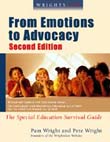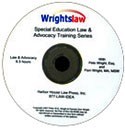|
|
In February 2008, a U.S. District Court in Pennsylvania issued a strong decision on behalf of a child with autism and his mother.
The issues in Tereance D. v School District of Philadelphia include the district's failure to provide FAPE over a period of years, misdiagnosing the child as mentally retarded and emotionally disturbed, misleading the parent about her son's rights to autism services and extended school year services, and more.
Learn about a new research tool to help diagnose autism earlier. Find out if you are eligible to participate in the Early Autism Study or the free research evaluations available from the National Institutes of Health.
Please don't hesitate to forward this issue to other families, friends, and colleagues.

Sign up free today! l Read previous issues |
|
| Court Issues Strong Decision on Behalf of a Child with Autism |
During early intervention, a district psychologist reported that Tereance needed learning support to receive FAPE. The District placed him in regular kindergarten - no support.
A year later, the District suspected that Tereance had autism but conducted flawed evaluations - or no evaluations at all.
The District's policies regarding ESY services did not meet state or federal law - and were actually designed to mislead parents about their ESY rights.
Judge Refuses to Dismiss Any Counts
Read the Court's decision in Tereance D. v School District of Philadelphia. This decision is a result of the school district's motion to dismiss several counts in Tereance D's Complaint.
The judge refused and found that:
- the school did not properly evaluate
- the school's evaluator was not competent to evaluate a child with autism
- teachers of kids with autism did not receive proper training
- the school evaluator misdiagnosed the child as MR, then as ED, before finally determining that he had an autism spectrum disorder
- school staff "misrepresented" to the parent the availability of autism support services
- school staff "misrepresented" to the parent the availability of ESY ("what we have wouldn't be appropriate for him")
- even after finding the child eligible for autism support services, the district dragged their feet, causing delays for years.
Hearing Officer Grants Some Compensatory Education; Review Panel Affirms
In addition to violations of IDEA, Tereance's mother also alleged violations under Section 504. As you read the Complaint, then read the decision, you'll have a clearer understanding of the standards that must be met to bring legal action under 504.
A hearing officer found in the parent's favor and awarded limited compensatory education, holding that the statute of limitations had expired on some claims. A Special Education Appeals Panel affirmed the hearing officer's order. The case was appealed to federal court.
Parents Have Independent, Enforceable Rights
The District attempted to dismiss the mother, Wanda D. as a plaintiff, claiming that she was not the "aggrieved party." Relying on the recent Supreme Court decision in Winkelman v. Parma, the Court held that the mother had standing on her own.
You'll want to read the powerful pro-parent, pro-child decision in Winkelman v. Parma. In Winkelman, the U. S. Supreme Court held that parents do have a "significant role." The Court provided a comprehensive list of parental rights from IDEA, affirming parental involvement and the essential role parents play in ensuring that their child receives a free appropriate education.
Jacob Winkelman v. Parma City Schools |
back to the top |
|
News: Resarch Tool Can Detect Autism at 9 Months of Age |
There is an urgent need for a quick, reliable, objective screening
tool to diagnose autism earlier. At present, the earliest
diagnostic test for autism is reliable around age two. Most children
are not diagnosed until age 3 or 4. With an earlier diagnosis,
children can get intensive treatment early and a better prognosis
for the future.
The ability to detect autism in children as young as 9 months is on
the horizon, according to researchers at McMaster University.
The Early Autism Study, led by Mel Rutherford, associate professor of
psychology, is using eye tracker technology that measures eye
direction while babies look at faces, eyes, and bouncing balls on a
computer screen. Rutherford presented her peer-reviewed research at
the 7th Annual International Meeting for Autism Research in London.
(www.autism-insar.org).
"With this tool, we can distinguish between a group of siblings with
autism from a group with no autism - at 9 to 12 months" says
Rutherford. "I can do this in 10 minutes, and it is objective ...
it's not influenced by a clinician's report or by intuition."
Join the Early Autism Study
The Early Autism Study is requesting volunteers.
"Do you have a young baby, early in his or her first year of life? We
are especially interested in babies who have autism in the family.
Does your baby have a sibling with autism? Come visit our lab, or we
can visit you!
Join the Early Autism Study!"
For more information about the Early Autism Study, please go to http://www.earlyautismstudy.com/
Full text of this article: tinyurl.com/3vya56
On the Autism, PDD & Asperger Syndome page, you will find FAQs, articles, legal resources, recommended books, free publications, and a short list of information and support groups. |
back to the top |
|
Clinical Research on Childhood Behavioral Problems: How You Can Participate |
 The Pediatric and Developmental Neuropsychiatry Branch of the National Institutes of Health is currently conducting a number of longitudinal studies for children 1 to 6 years of age. The Pediatric and Developmental Neuropsychiatry Branch of the National Institutes of Health is currently conducting a number of longitudinal studies for children 1 to 6 years of age.
Five groups are part of this study:
- Children with aggressive onset of autism
- Children with autism and no history of regression
- Children with Rett Disorder
- Developmentally delayed children
- Typically developing children
The study includes a comprehensive baseline assessment including cognitive and behavioral testing, neurological evaluation, laboratory assays, MRI, and EEG work ups by a team of specialists in pediatrics, child psychology, child psychiatry, pediatric neurology, and social work.
This study is located in Bethesda, MD. All NIH research evaluations are free of charge. Travel stipends are available. The identifier number of this study is NCT00298246.
For more details and to find out if your child is eligible call 301-435-7962 or 800-411-1222 (TTY 1-866-411-1010) or email: NIMH-ASD@mail.nih.gov.
More information about this study. |
|
back to the top |
|
|








